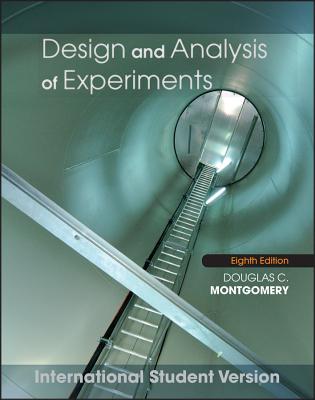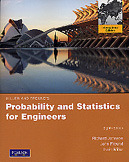Design and Analysis of Experiments, 8/e (IE-Paperback)
暫譯: 實驗設計與分析,第8版 (IE-平裝本)
Douglas C. Montgomery
- 出版商: Wiley
- 出版日期: 2012-05-01
- 定價: $1,620
- 售價: 9.8 折 $1,588
- 語言: 英文
- 頁數: 752
- ISBN: 1118097939
- ISBN-13: 9781118097939
-
相關分類:
Data Science、機率統計學 Probability-and-statistics
立即出貨 (庫存=1)
買這商品的人也買了...
-
 多變量分析 (Applied Mutivariate Techniques)
多變量分析 (Applied Mutivariate Techniques)$550$539 -
 高等統計學 (Hogg : Probability and Statistical Inference, 8/e)
高等統計學 (Hogg : Probability and Statistical Inference, 8/e)$880$836 -
 Grokking Deep Reinforcement Learning (Paperback)
Grokking Deep Reinforcement Learning (Paperback)$1,900$1,805 -
 Introduction to Robotics: Mechanics and Control, 4/e (IE-Paperback)
Introduction to Robotics: Mechanics and Control, 4/e (IE-Paperback)$1,480$1,450 -
 $1,935Time Series Forecasting in Python (Paperback)
$1,935Time Series Forecasting in Python (Paperback)
商品描述
本書序言
●The residual maximum likelihood (REML) method is now emphasized throughout the book.
●83 new homework problems (including in the areas of biochemistry and biotechnology).
●Additional examples of single-factor experiments, such as a study involving chocolate consumption and cardiovascular health (Chapter 3)
●New section on the random effects model (Chapter 3)
●New material on nonregular fractions as alternatives to traditional minimum aberration fractions in 16 runs and analysis methods for those designs discussed and illustrated (Chapter 9).
●New material on constructing factorial and fractional factorial designs using an optimal design tool (Chapter 9).
●New topics and problems in the area of response surface, including designs that combine screening and optimization and use of optimal designs (Chapter 11).
●New topics in nested and split-plot design, including the use of REML in the analysis (Chapter 14).
本書特色
●Includes software examples taken from the four most dominant programs in the field: Design-Expert, Minitab, JMP, and SAS.
●Focuses on the connection between the experiment and the model that the experimenter can develop from the results of the experiement.
●Stresses the importance of experimental design as a tool for engineers and scientists to use for product design and development as well as process development and improvement. The use of experiemental design in developing products that are robust to environmental factors and other sources of variability is illustrated. The use of experimental design early in the product cycle can subsatantially reduce development lead time and cost, leading to processes and products that perform better in the field and have higher reliability than those developed using other approaches.
商品描述(中文翻譯)
本書序言
● 本書中強調了殘差最大似然法(Residual Maximum Likelihood, REML)。
● 新增83個作業問題(包括生物化學和生物技術領域)。
● 增加了單因子實驗的額外範例,例如涉及巧克力消費與心血管健康的研究(第3章)。
● 新增隨機效應模型的部分(第3章)。
● 新增有關非正規分數作為傳統最小偏差分數替代方案的材料,並討論和說明這些設計的分析方法(第9章)。
● 新增使用最佳設計工具構建全因子和分數因子設計的材料(第9章)。
● 在響應面領域新增主題和問題,包括結合篩選和優化的設計以及使用最佳設計(第11章)。
● 在嵌套和分割區設計中新增主題,包括在分析中使用REML(第14章)。
本書特色
● 包含來自該領域四個最主要程式的軟體範例:Design-Expert、Minitab、JMP和SAS。
● 專注於實驗與實驗者可以從實驗結果中發展的模型之間的連結。
● 強調實驗設計作為工程師和科學家在產品設計和開發以及過程開發和改進中使用的工具的重要性。展示了在開發對環境因素和其他變異來源具有穩健性的產品中使用實驗設計的情況。早期在產品週期中使用實驗設計可以顯著減少開發的前置時間和成本,從而導致在實際應用中表現更佳且可靠性高於使用其他方法開發的過程和產品。
目錄大綱
1 Introduction to Designed Experiments
2 Basic Statistical Methods
3 Analysis of Variance
4 Experiments with Blocking Factors
5 Factorial Experiments
6 Two-Level Factorial Designs
7 Blocking and Confounding System for Two-Level Factorials
8 Two-Level Fractional Factorial Designs
9 Other Topics on Factorial and Fractional Factorial Designs
10 Regression Modeling
11 Response Surface Methodology
12 Robust Design
13 Random Effects Models
14 Experiments with Nested Factors and Hard-to-Change Factors
15 Other Topics
Appendix
目錄大綱(中文翻譯)
1 Introduction to Designed Experiments
2 Basic Statistical Methods
3 Analysis of Variance
4 Experiments with Blocking Factors
5 Factorial Experiments
6 Two-Level Factorial Designs
7 Blocking and Confounding System for Two-Level Factorials
8 Two-Level Fractional Factorial Designs
9 Other Topics on Factorial and Fractional Factorial Designs
10 Regression Modeling
11 Response Surface Methodology
12 Robust Design
13 Random Effects Models
14 Experiments with Nested Factors and Hard-to-Change Factors
15 Other Topics
Appendix
















